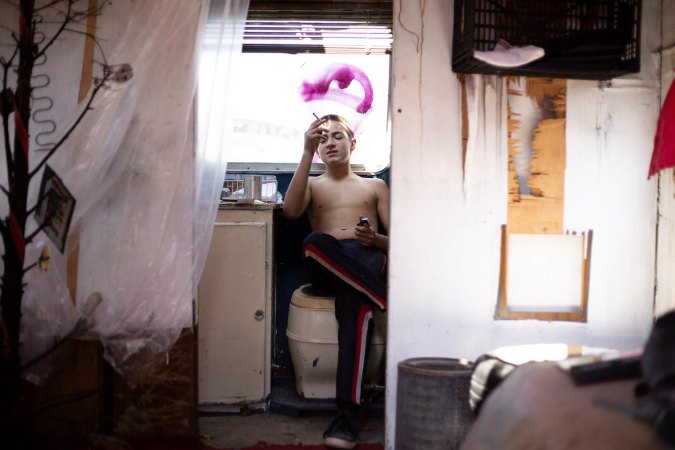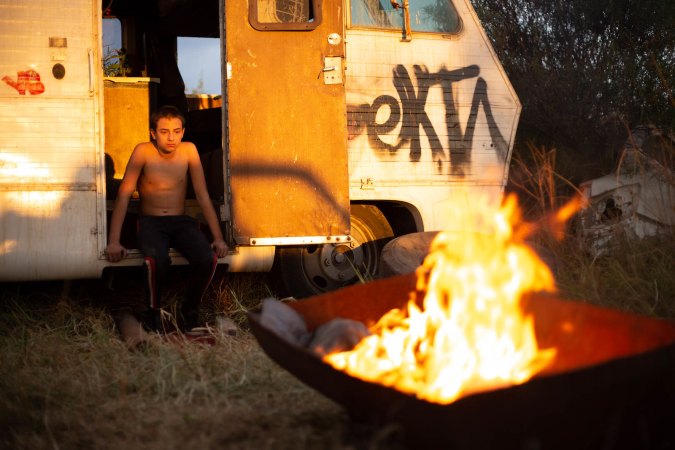There is no more quintessential a figure in 21st-century Mexican cinema than the teenage boy. Films like Y tu mamá también, Güeros, Temporada de patos, Chicuarotes and Huachicolero have put young men’s inner lives at the center of their narratives. These coming-of-age tales have, in many of these cases, come to speak to Mexico’s own self-image. Julio and Tenoch, played by Gael García Bernal and Diego Luna in Alfonso Cuarón’s 2001 hit Y tu mamá también, for example, became gateways through which to see — quite literally in that road trip movie — a new kind of Mexico at the turn of the century. Those most recent stories, one directed by Gael himself, the other set in the timely world of gas thieves, have offered a more violent and hopeless view of young men today. In these films, there are few options for bright-eyed young boys today; all they have left are grievances against their communities and their governments, against their families and their way of life.
Rodrigo Ruiz Patterson’s Blanco de verano (Summer White) blends seamlessly into this tradition. Despite its sunny title and sunnier cinematography, this is a bleak film about a protagonist who’s adrift in a world that both demands he man up and which cannot handle the toxic masculinity he’s bound to unleash. At its center is Rodrigo (an electric Adrián Rossi), a 13-year-old boy who sees his tight-knit relationship with his mother threatened by the appearance of a boyfriend in her life. Almost Oedipal in plot, Summer White opens with intimate scenes between Rodrigo and his mother, Valeria (Sophie Alexander-Katz), that almost encourage you to wonder if they aren’t, indeed, too close to one another. When, in the middle of the night, a shirtless Rodrigo slinks into Valeria’s bed, there’s a tenderness that borders on the erotic.
When, days later, he tries the same move and finds her door locked because she’s brought home her new boyfriend, Fernando (Fabián Corres), he grits his teeth and seethes over being slighted. This intrusion into his home territory drives much of Summer White’s threadbare plot: as Rodrigo starts to move in and tries to bond with Rodrigo, the two men’s rivalry becomes a cold war that risks destroying the three-person household Valeria so wishes to have.

At its core, Summer White is an exploration of aggrieved masculinity. Rodrigo – who skips classes when he pleases, spends time refurbishing an abandoned RV in a scrapyard and finds nothing as exciting as toying with his lighter – is all bottled-up anger that — until well-meaning Fernando arrives — had nowhere to go. Stoic almost to a fault, this is a kid who suddenly can never keep his cool. Rossi, who’s so warm whenever Rodrigo is around Valeria, captures the way such placid tenderness not only masks but suggests a deep well of resentment. His sudden fits of hysterics, filled with heavy breathing and exasperated red-faced heaving, make you feel increasingly scared for those around him. Here is someone who’s one tantrum away from wreaking havoc. Being a good son and being a real-life threat aren’t posited here as mutually exclusive formulations, which is what makes Ruiz Patterson’s script read both as a character study and a warning sign.

With its airy, almost dreamy hand-held cinematography, Summer White puts us squarely in Rodrigo’s headspace. Our eyes follow him from an almost too uncomfortably close distance. There’s claustrophobia that Ruiz Patterson builds into the story: The cramped two-story apartment Valeria and Rodrigo share is at first an oasis for the young boy, a place where he feels safe. It’s only when it begins to be intruded upon by Fernando and his things (the title refers to the paint color both he and Valeria decide to redecorate with) that the outside world, at first chilly and alienating, looks like a more welcoming escape.

But that intimacy the film creates between the viewer and Rodrigo is also what makes Summer White feel all the more insidious. In asking us to empathize with this emotionally stunted young man who feels so aggrieved by having to accept his mother’s own agency (sexual and otherwise), the film narrows its scope to the point where it can only replicate (and never question) Rodrigo’s own plight.
The Mexican indie may be light years away from a box office behemoth like Joker but in its desire to have us understand what drives loner men to violence, one cannot help but feel an affinity between Ruiz Patterson’s project and Todd Phillips’ character study on Batman’s villain. Just as unsavory (and tastefully acted) as that comic book drama, Summer White paints a dour image of contemporary masculinity. But in centering its story on such toxicity, Summer White asphyxiates its viewer before they even get a chance to breathe.
Summer White screened as part of the 2020 Sundance Film Festival.




